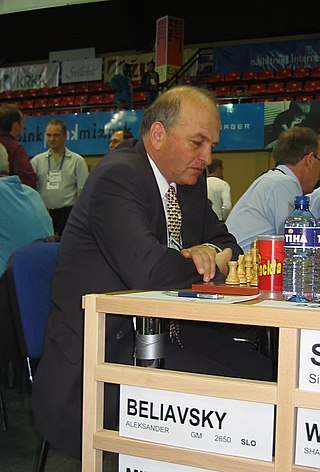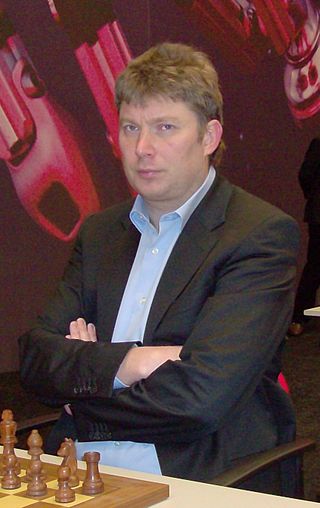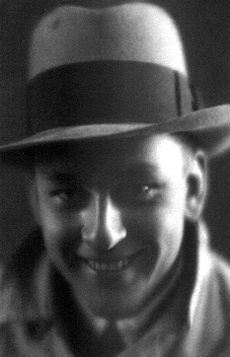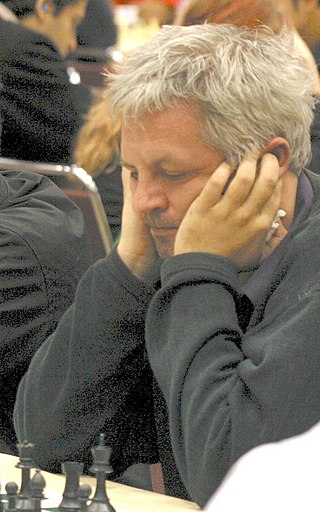Related Research Articles

Alexander Genrikhovich Beliavsky is a Soviet, Ukrainian and Slovenian chess player. He was awarded the title of Grandmaster by FIDE in 1975. He is also a chess coach and in 2004 was awarded the title of FIDE Senior Trainer.

Mikhail Nekhemyevich Tal was a Soviet-Latvian chess player and the eighth World Chess Champion. He is considered a creative genius and is widely regarded as one of the most influential chess players. Tal played in an attacking and daring combinatorial style. His play was known above all for improvisation and unpredictability. Vladislav Zubok said of him, "Every game for him was as inimitable and invaluable as a poem".

Paul Keres was an Estonian chess grandmaster and chess writer. He was among the world's top players from the mid-1930s to the mid-1960s, and narrowly missed a chance at a World Chess Championship match on five occasions. As Estonia was repeatedly invaded and occupied during World War II, Keres was forced by the circumstances to represent the former Soviet Union and Nazi Germany (1941–44) in international tournaments.

Alexei Shirov is a Latvian and Spanish chess player. Shirov was ranked number two in the world in 1994.

Vladas Mikėnas was a Lithuanian chess player and journalist. He was awarded the titles of International Master and Honorary Grandmaster by FIDE.

Aleksander Wojtkiewicz was a Polish chess grandmaster. He was born in Latvia. In his early teens he was already a strong player; a student of ex-world champion Mikhail Tal whom he assisted in the 1979 Interzonal tournament in Riga. He won the Latvian Chess Championship in 1981. His promising chess career was interrupted when he refused to join the Soviet Army. For several years he went undercover but in 1986 he was sentenced to two years in prison. After one year he received an amnesty after the meeting of Presidents Ronald Reagan and Mikhail Gorbachev. Following his release he moved from Riga to Warsaw where he won two Polish Chess Championships. He played for Poland in the Chess Olympiads of 1990 and 1992.
Lembit Oll was an Estonian chess grandmaster.
Jonathan Berry is a Canadian International Correspondence Chess Grandmaster, a FIDE Master, a FIDE International Arbiter, and a chess administrator, writer and editor. He is the only Canadian ever to hold international titles for over-the-board chess, correspondence chess, and chess arbiter.

Vladimir Pavlovich Malaniuk was a Ukrainian chess grandmaster and three-time Ukrainian champion. He competed in the FIDE World Chess Championship 1998. In team events, Malaniuk played for Ukraine in three Chess Olympiads, two World Team Chess Championships and 1997 European Team Chess Championship. He won team silver and bronze medals in 1996 and 1998 Chess Olympiads respectively, team silver and an individual gold medals in the 1993 World Team Championship.

Zigurds Lanka is a Latvian chess player. In over-the-board chess, he received the FIDE titles of International Master (IM) in 1987 and Grandmaster (GM) in 1992. In correspondence chess, he earned the title of Correspondence Chess International Master (IM) in 1989.
Tuulikki Laesson is an Estonian chess player who twice won the Estonian Chess Championship for women.
Gunnar Uusi was an Estonian chess player who won the Estonian Chess Championship six times.

Boris Rõtov was a Russian-Estonian chess player who won the Estonian Chess Championship (1978).
Leili Pärnpuu was an Estonian chess player who won the Estonian Women's Chess Championship five times.
Tatjana Fomina is an Estonian chess player holding the title of Woman Grandmaster and twice European senior women's champion.
Aleksander Arulaid was an Estonian chess player. He was a three-time winner of the Estonian Chess Championship.

Hillar Kärner was an Estonian chess player who won the Estonian Chess Championship seven times. He received the FIDE title of International Master (IM) in 1980.

Tomas Laurušas is a Lithuanian chess player who holds the title of Grandmaster. He is the three time Lithuanian Chess Championship winner.
Gennadij Timoscenko, is a Russian and Slovak chess Grandmaster (GM) (1980).

Aleksandr Volodin is an Estonian chess grandmaster (2011), three-times Estonian Chess Championships winner.